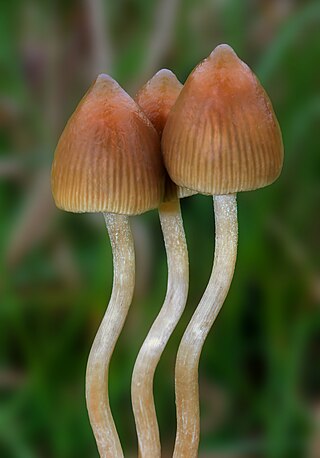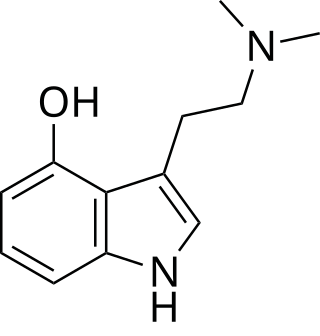
Psilocybin, also known as 4-phosphoryloxy-N,N-dimethyltryptamine (4-PO-DMT), and formerly sold under the brand name Indocybin, is a naturally occurring psychedelic prodrug compound produced by more than 200 species of fungi. Psilocybin is itself biologically inactive but is quickly converted by the body to psilocin, which has mind-altering effects similar, in some aspects, to those of other classical psychedelics. Effects include euphoria, hallucinations, changes in perception, a distorted sense of time, and perceived spiritual experiences. It can also cause adverse reactions such as nausea and panic attacks.

Psilocybe cubensis, commonly known as the magic mushroom, shroom, golden halo, golden teacher, cube, or gold cap, is a species of psilocybin mushroom of moderate potency whose principal active compounds are psilocybin and psilocin. It belongs to the fungus family Hymenogastraceae and was previously known as Stropharia cubensis. It is the best-known psilocybin mushroom due to its wide distribution and ease of cultivation.

Psilocybin mushrooms, commonly known as magic mushrooms,shrooms, or broadly as hallucinogenic mushrooms, are a polyphyletic informal group of fungi that contain psilocybin, which turns into psilocin upon ingestion. The most potent species are members of genus Psilocybe, such as P. azurescens, P. semilanceata, and P. cyanescens, but psilocybin has also been isolated from approximately a dozen other genera, including Panaeolus, Inocybe, Pluteus, Gymnopilus, and Pholiotina.

Psilocybe is a genus of gilled mushrooms, growing worldwide, in the family Hymenogastraceae. Many species contain the psychedelic compounds psilocybin and psilocin.

Psilocybe semilanceata, commonly known as the liberty cap, is a species of fungus which produces the psychoactive compounds psilocybin, psilocin and baeocystin. It is both one of the most widely distributed psilocybin mushrooms in nature, and one of the most potent. The mushrooms have a distinctive conical to bell-shaped cap, up to 2.5 cm (1 in) in diameter, with a small nipple-like protrusion on the top. They are yellow to brown, covered with radial grooves when moist, and fade to a lighter color as they mature. Their stipes tend to be slender and long, and the same color or slightly lighter than the cap. The gill attachment to the stipe is adnexed, and they are initially cream-colored before tinting purple to black as the spores mature. The spores are dark purplish-brown en masse, ellipsoid in shape, and measure 10.5–15 by 6.5–8.5 micrometres.

Psilocybe cyanescens, commonly known as the wavy cap or potent psilocybe, is a species of potent psychedelic mushroom. The main compounds responsible for its psychedelic effects are psilocybin and psilocin. It belongs to the family Hymenogastraceae. A formal description of the species was published by Elsie Wakefield in 1946 in the Transactions of the British Mycological Society, based on a specimen she had recently collected at Kew Gardens. She had begun collecting the species as early as 1910. The mushroom is not generally regarded as being physically dangerous to adults. Since all the psychoactive compounds in P. cyanescens are water-soluble, the fruiting bodies can be rendered non-psychoactive through parboiling, allowing their culinary use. However, since most people find them overly bitter and they are too small to have great nutritive value, this is not frequently done.

Psilocin, also known as 4-hydroxy-N,N-dimethyltryptamine (4-OH-DMT), is a substituted tryptamine alkaloid and a serotonergic psychedelic. It is present in most psychedelic mushrooms together with its phosphorylated counterpart psilocybin. Psilocin is a Schedule I drug under the Convention on Psychotropic Substances. Acting on the serotonin 5-HT2A receptors, psilocin's psychedelic effects are directly correlated with the drug's occupancy at these receptor sites. The subjective mind-altering effects of psilocin are highly variable and are said to resemble those of lysergic acid diethylamide (LSD) and N,N-dimethyltryptamine (DMT).

Marc Scott Emery is a Canadian cannabis rights activist, entrepreneur and politician. Often described as the "Prince of Pot", Emery has been a notable advocate of international cannabis policy reform, and has been active in multiple Canadian political parties at the provincial and federal levels. Emery has been jailed several times for his cannabis activism.
A smart shop is a retail establishment that specializes in the sale of psychoactive substances, usually including psychedelics, as well as related literature and paraphernalia. The name derives from the name "smart drugs", a class of drugs and food supplements intended to enhance cognitive abilities which are often sold in smart shops.

4-HO-MiPT is a synthetic substituted aromatic compound and a lesser-known psychedelic tryptamine. It is thought to be a serotonergic psychedelic, similar to magic mushrooms, LSD and mescaline. Its molecular structure and pharmacological effects somewhat resemble those of the tryptamine psilocin, which is the primary psychoactive chemical in magic mushrooms.

Psilacetin, also known as O-acetylpsilocin or as 4-acetoxy-N,N-dimethyltryptamine, is a semi-synthetic serotonergic psychedelic drug that has been suggested by David Nichols to be a potentially useful alternative to psilocybin for pharmacological studies, as they are both believed to be prodrugs of psilocin. However, some users report that O-acetylpsilocin's subjective effects differ from those of psilocybin and psilocin. Additionally, some users prefer 4-AcO-DMT to natural psilocybin mushrooms due to feeling fewer adverse side effects such as nausea and heavy body load, which are more frequently reported in experiences involving natural mushrooms. It is the acetylated form of the psilocybin mushroom alkaloid psilocin and is a lower homolog of 4-AcO-MET, 4-AcO-DET, 4-AcO-MiPT and 4-AcO-DiPT.

Conocybula cyanopus is a species of fungus that contains psychoactive compounds including psilocybin and the uncommon aeruginascin. Originally described as Galerula cyanopus by American mycologist George Francis Atkinson in 1918. It was transferred to Conocybe by Robert Kühner in 1935 before being transferred to Pholiotina by Rolf Singer in 1950 and finally to Conocybula by T. Bau & H. B. Song in 2024. Conocybula cyanopus is recognized as the type species of Conocybula sect. Cyanopodae.

Drug policy of California refers to the policy on various classes and kinds of drugs in the U.S. state of California. Cannabis possession has been legalized with the Adult Use of Marijuana Act, passed in November 2016, with recreational sales starting January of the next year. With respect to many controlled substances, terms such as illegal and prohibited do not include their authorized possession or sale as laid out by applicable laws.

Dana Albert Larsen is a Canadian author, businessman, philanthropist and activist for cannabis and drug policy reform. Larsen currently operates businesses and non-profit societies in Vancouver including The Medicinal Cannabis Dispensary, The Medicinal Mushroom Dispensary, The Coca Leaf Cafe, Pothead Books, and the Get Your Drugs Tested centre.

The legal status of unauthorised actions with psilocybin mushrooms varies worldwide. Psilocybin and psilocin are listed as Schedule I drugs under the United Nations 1971 Convention on Psychotropic Substances. Schedule I drugs are defined as drugs with a high potential for abuse or drugs that have no recognized medical uses. However, psilocybin mushrooms have had numerous medicinal and religious uses in dozens of cultures throughout history and have a significantly lower potential for abuse than other Schedule I drugs.

Magic truffles are the sclerotia of psilocybin mushrooms that are not technically the same as "mushrooms". They are masses of mycelium that contain the fruiting body which contains the hallucinogenic chemicals psilocybin and psilocin.

Cannabis in New Brunswick became legal for recreational use when the Cannabis Act went into force across the country on October 17, 2018.

Psilocybin therapy is the use of psilocybin in treating a range of mental health conditions, such as depression, anxiety, addictions, obsessive compulsive disorder (OCD), and psychosis. It is one of several forms of psychedelic therapy under study. Psilocybin was popularized as a psychedelic recreational drug in the 1970s and was classified as a Schedule I drug by the DEA. Research on psilocybin as a medical treatment was restricted until the 1990s because of the sociocultural fear of dependence on this drug. As of 2022, psilocybin is the most commonly researched psychedelic due to its safety and low potential for abuse and dependence. Clinical trials are being conducted at universities and there is evidence confirming the use of psilocybin in the treatment of depression, post-traumatic stress disorder (PTSD) and end of life anxiety.

The movement to decriminalize psilocybin in the United States began in 2019 with Denver, Colorado, becoming the first city to decriminalize psilocybin in May of that year. The cities of Oakland and Santa Cruz, California, decriminalized psilocybin in June 2019 and January 2020, respectively. Washington, D.C., followed soon in November 2020, as did Somerville, Massachusetts, in January 2021, and then the neighboring Cambridge and Northampton in February 2021 and March 2021, respectively. Seattle, Washington, became the largest U.S. city on the growing list in October 2021. Detroit, Michigan, followed in November 2021.
Shroom House is a pair of shops which have sold psychedelic mushrooms illegally in Vancouver, British Columbia, Canada, as well as Portland, Oregon, United States.

















